Principles of Recovery: The Case of Sandy Jeffs
VerifiedAdded on 2023/06/13
|10
|2391
|120
AI Summary
This paper explains how the lived experiences of Sandy Jeffs can help mental health professionals align their practice with the recovery principles for recovery orientated medical health services.
Contribute Materials
Your contribution can guide someone’s learning journey. Share your
documents today.
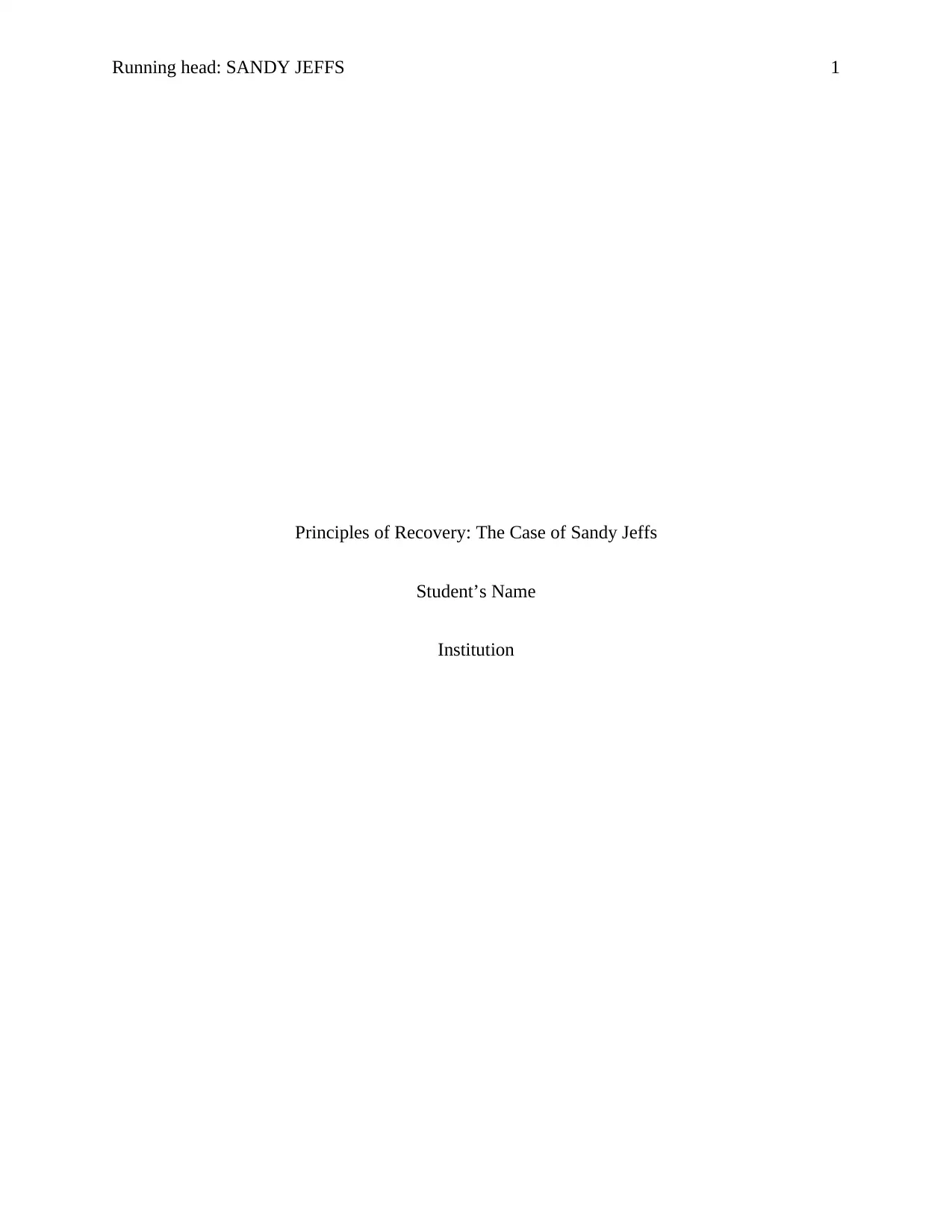
Running head: SANDY JEFFS 1
Principles of Recovery: The Case of Sandy Jeffs
Student’s Name
Institution
Principles of Recovery: The Case of Sandy Jeffs
Student’s Name
Institution
Secure Best Marks with AI Grader
Need help grading? Try our AI Grader for instant feedback on your assignments.
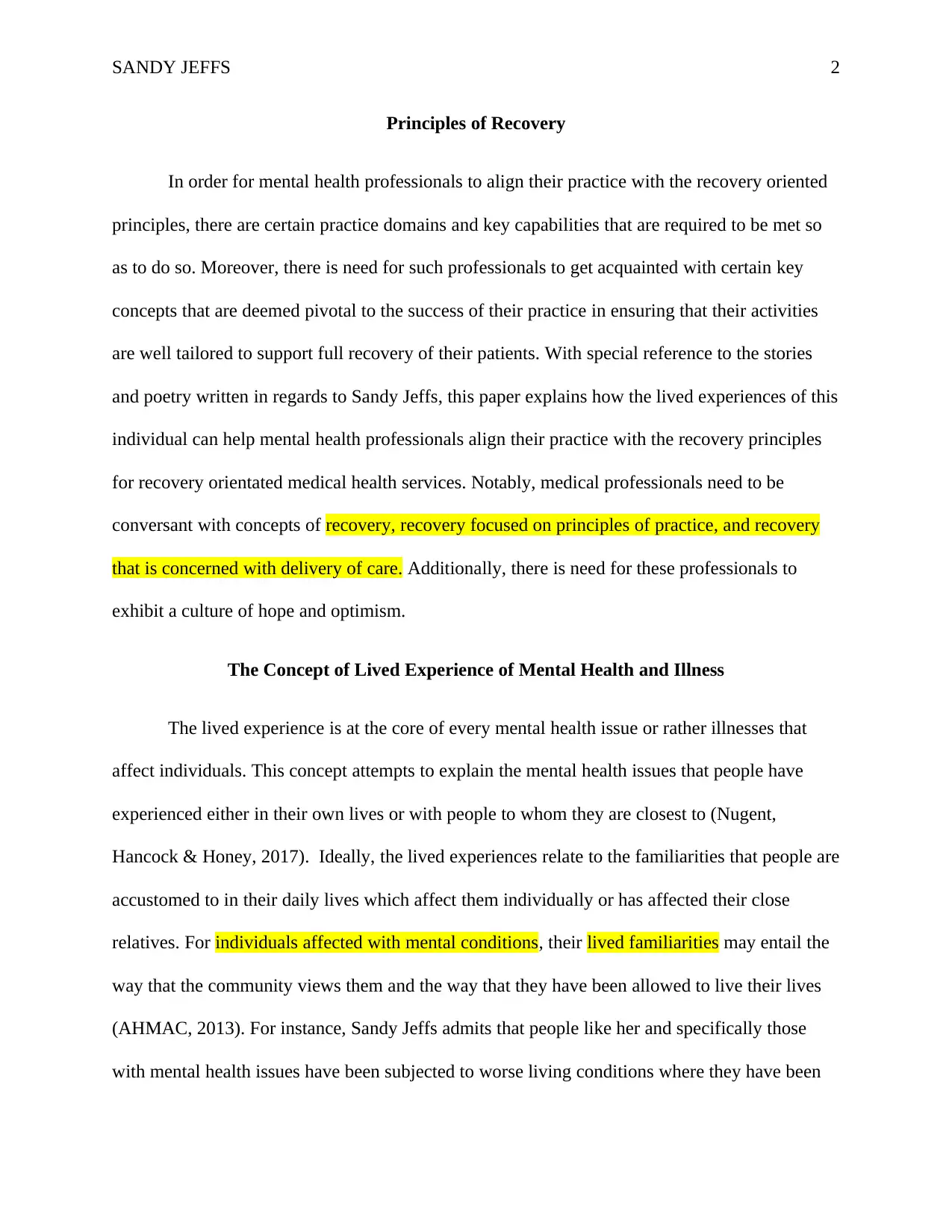
SANDY JEFFS 2
Principles of Recovery
In order for mental health professionals to align their practice with the recovery oriented
principles, there are certain practice domains and key capabilities that are required to be met so
as to do so. Moreover, there is need for such professionals to get acquainted with certain key
concepts that are deemed pivotal to the success of their practice in ensuring that their activities
are well tailored to support full recovery of their patients. With special reference to the stories
and poetry written in regards to Sandy Jeffs, this paper explains how the lived experiences of this
individual can help mental health professionals align their practice with the recovery principles
for recovery orientated medical health services. Notably, medical professionals need to be
conversant with concepts of recovery, recovery focused on principles of practice, and recovery
that is concerned with delivery of care. Additionally, there is need for these professionals to
exhibit a culture of hope and optimism.
The Concept of Lived Experience of Mental Health and Illness
The lived experience is at the core of every mental health issue or rather illnesses that
affect individuals. This concept attempts to explain the mental health issues that people have
experienced either in their own lives or with people to whom they are closest to (Nugent,
Hancock & Honey, 2017). Ideally, the lived experiences relate to the familiarities that people are
accustomed to in their daily lives which affect them individually or has affected their close
relatives. For individuals affected with mental conditions, their lived familiarities may entail the
way that the community views them and the way that they have been allowed to live their lives
(AHMAC, 2013). For instance, Sandy Jeffs admits that people like her and specifically those
with mental health issues have been subjected to worse living conditions where they have been
Principles of Recovery
In order for mental health professionals to align their practice with the recovery oriented
principles, there are certain practice domains and key capabilities that are required to be met so
as to do so. Moreover, there is need for such professionals to get acquainted with certain key
concepts that are deemed pivotal to the success of their practice in ensuring that their activities
are well tailored to support full recovery of their patients. With special reference to the stories
and poetry written in regards to Sandy Jeffs, this paper explains how the lived experiences of this
individual can help mental health professionals align their practice with the recovery principles
for recovery orientated medical health services. Notably, medical professionals need to be
conversant with concepts of recovery, recovery focused on principles of practice, and recovery
that is concerned with delivery of care. Additionally, there is need for these professionals to
exhibit a culture of hope and optimism.
The Concept of Lived Experience of Mental Health and Illness
The lived experience is at the core of every mental health issue or rather illnesses that
affect individuals. This concept attempts to explain the mental health issues that people have
experienced either in their own lives or with people to whom they are closest to (Nugent,
Hancock & Honey, 2017). Ideally, the lived experiences relate to the familiarities that people are
accustomed to in their daily lives which affect them individually or has affected their close
relatives. For individuals affected with mental conditions, their lived familiarities may entail the
way that the community views them and the way that they have been allowed to live their lives
(AHMAC, 2013). For instance, Sandy Jeffs admits that people like her and specifically those
with mental health issues have been subjected to worse living conditions where they have been
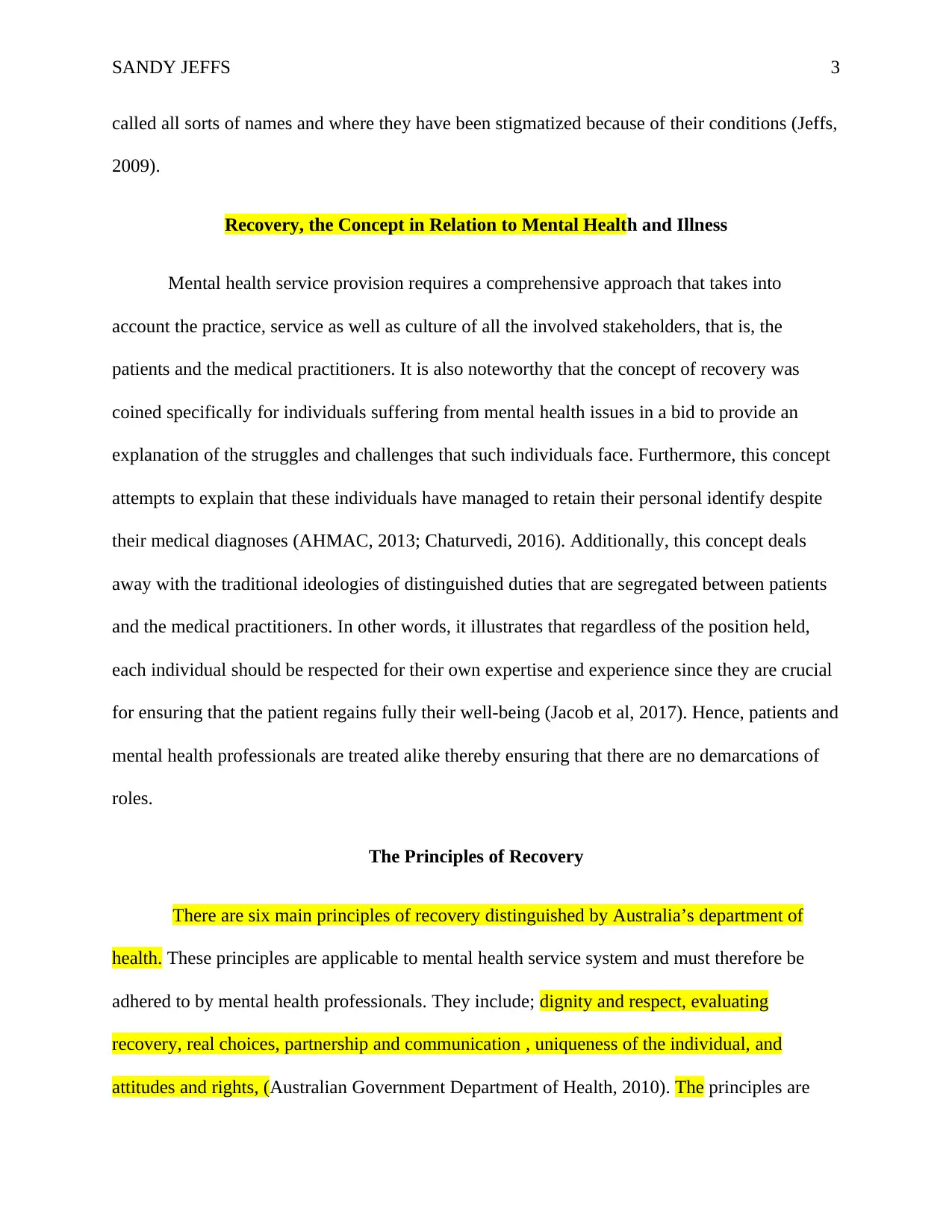
SANDY JEFFS 3
called all sorts of names and where they have been stigmatized because of their conditions (Jeffs,
2009).
Recovery, the Concept in Relation to Mental Health and Illness
Mental health service provision requires a comprehensive approach that takes into
account the practice, service as well as culture of all the involved stakeholders, that is, the
patients and the medical practitioners. It is also noteworthy that the concept of recovery was
coined specifically for individuals suffering from mental health issues in a bid to provide an
explanation of the struggles and challenges that such individuals face. Furthermore, this concept
attempts to explain that these individuals have managed to retain their personal identify despite
their medical diagnoses (AHMAC, 2013; Chaturvedi, 2016). Additionally, this concept deals
away with the traditional ideologies of distinguished duties that are segregated between patients
and the medical practitioners. In other words, it illustrates that regardless of the position held,
each individual should be respected for their own expertise and experience since they are crucial
for ensuring that the patient regains fully their well-being (Jacob et al, 2017). Hence, patients and
mental health professionals are treated alike thereby ensuring that there are no demarcations of
roles.
The Principles of Recovery
There are six main principles of recovery distinguished by Australia’s department of
health. These principles are applicable to mental health service system and must therefore be
adhered to by mental health professionals. They include; dignity and respect, evaluating
recovery, real choices, partnership and communication , uniqueness of the individual, and
attitudes and rights, (Australian Government Department of Health, 2010). The principles are
called all sorts of names and where they have been stigmatized because of their conditions (Jeffs,
2009).
Recovery, the Concept in Relation to Mental Health and Illness
Mental health service provision requires a comprehensive approach that takes into
account the practice, service as well as culture of all the involved stakeholders, that is, the
patients and the medical practitioners. It is also noteworthy that the concept of recovery was
coined specifically for individuals suffering from mental health issues in a bid to provide an
explanation of the struggles and challenges that such individuals face. Furthermore, this concept
attempts to explain that these individuals have managed to retain their personal identify despite
their medical diagnoses (AHMAC, 2013; Chaturvedi, 2016). Additionally, this concept deals
away with the traditional ideologies of distinguished duties that are segregated between patients
and the medical practitioners. In other words, it illustrates that regardless of the position held,
each individual should be respected for their own expertise and experience since they are crucial
for ensuring that the patient regains fully their well-being (Jacob et al, 2017). Hence, patients and
mental health professionals are treated alike thereby ensuring that there are no demarcations of
roles.
The Principles of Recovery
There are six main principles of recovery distinguished by Australia’s department of
health. These principles are applicable to mental health service system and must therefore be
adhered to by mental health professionals. They include; dignity and respect, evaluating
recovery, real choices, partnership and communication , uniqueness of the individual, and
attitudes and rights, (Australian Government Department of Health, 2010). The principles are
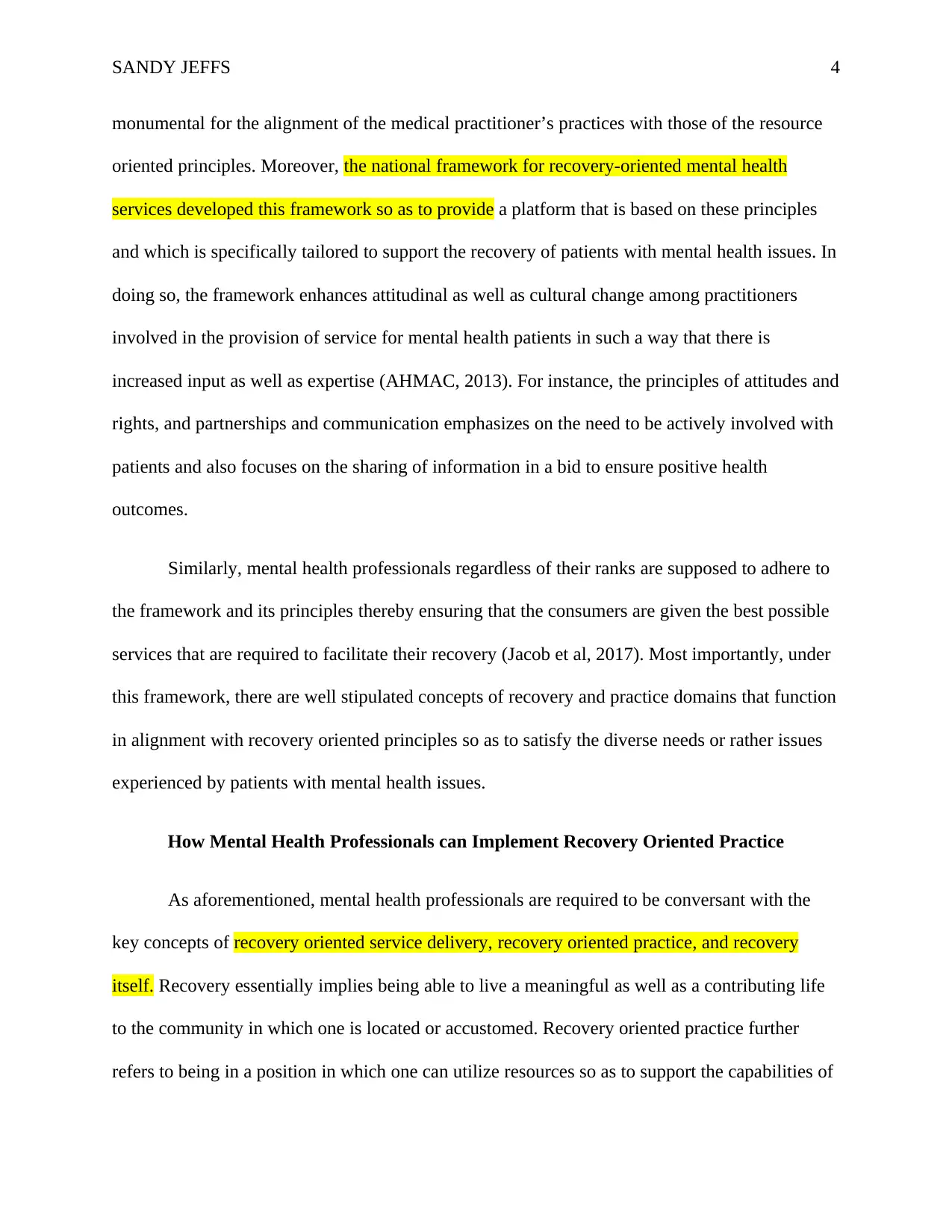
SANDY JEFFS 4
monumental for the alignment of the medical practitioner’s practices with those of the resource
oriented principles. Moreover, the national framework for recovery-oriented mental health
services developed this framework so as to provide a platform that is based on these principles
and which is specifically tailored to support the recovery of patients with mental health issues. In
doing so, the framework enhances attitudinal as well as cultural change among practitioners
involved in the provision of service for mental health patients in such a way that there is
increased input as well as expertise (AHMAC, 2013). For instance, the principles of attitudes and
rights, and partnerships and communication emphasizes on the need to be actively involved with
patients and also focuses on the sharing of information in a bid to ensure positive health
outcomes.
Similarly, mental health professionals regardless of their ranks are supposed to adhere to
the framework and its principles thereby ensuring that the consumers are given the best possible
services that are required to facilitate their recovery (Jacob et al, 2017). Most importantly, under
this framework, there are well stipulated concepts of recovery and practice domains that function
in alignment with recovery oriented principles so as to satisfy the diverse needs or rather issues
experienced by patients with mental health issues.
How Mental Health Professionals can Implement Recovery Oriented Practice
As aforementioned, mental health professionals are required to be conversant with the
key concepts of recovery oriented service delivery, recovery oriented practice, and recovery
itself. Recovery essentially implies being able to live a meaningful as well as a contributing life
to the community in which one is located or accustomed. Recovery oriented practice further
refers to being in a position in which one can utilize resources so as to support the capabilities of
monumental for the alignment of the medical practitioner’s practices with those of the resource
oriented principles. Moreover, the national framework for recovery-oriented mental health
services developed this framework so as to provide a platform that is based on these principles
and which is specifically tailored to support the recovery of patients with mental health issues. In
doing so, the framework enhances attitudinal as well as cultural change among practitioners
involved in the provision of service for mental health patients in such a way that there is
increased input as well as expertise (AHMAC, 2013). For instance, the principles of attitudes and
rights, and partnerships and communication emphasizes on the need to be actively involved with
patients and also focuses on the sharing of information in a bid to ensure positive health
outcomes.
Similarly, mental health professionals regardless of their ranks are supposed to adhere to
the framework and its principles thereby ensuring that the consumers are given the best possible
services that are required to facilitate their recovery (Jacob et al, 2017). Most importantly, under
this framework, there are well stipulated concepts of recovery and practice domains that function
in alignment with recovery oriented principles so as to satisfy the diverse needs or rather issues
experienced by patients with mental health issues.
How Mental Health Professionals can Implement Recovery Oriented Practice
As aforementioned, mental health professionals are required to be conversant with the
key concepts of recovery oriented service delivery, recovery oriented practice, and recovery
itself. Recovery essentially implies being able to live a meaningful as well as a contributing life
to the community in which one is located or accustomed. Recovery oriented practice further
refers to being in a position in which one can utilize resources so as to support the capabilities of
Secure Best Marks with AI Grader
Need help grading? Try our AI Grader for instant feedback on your assignments.
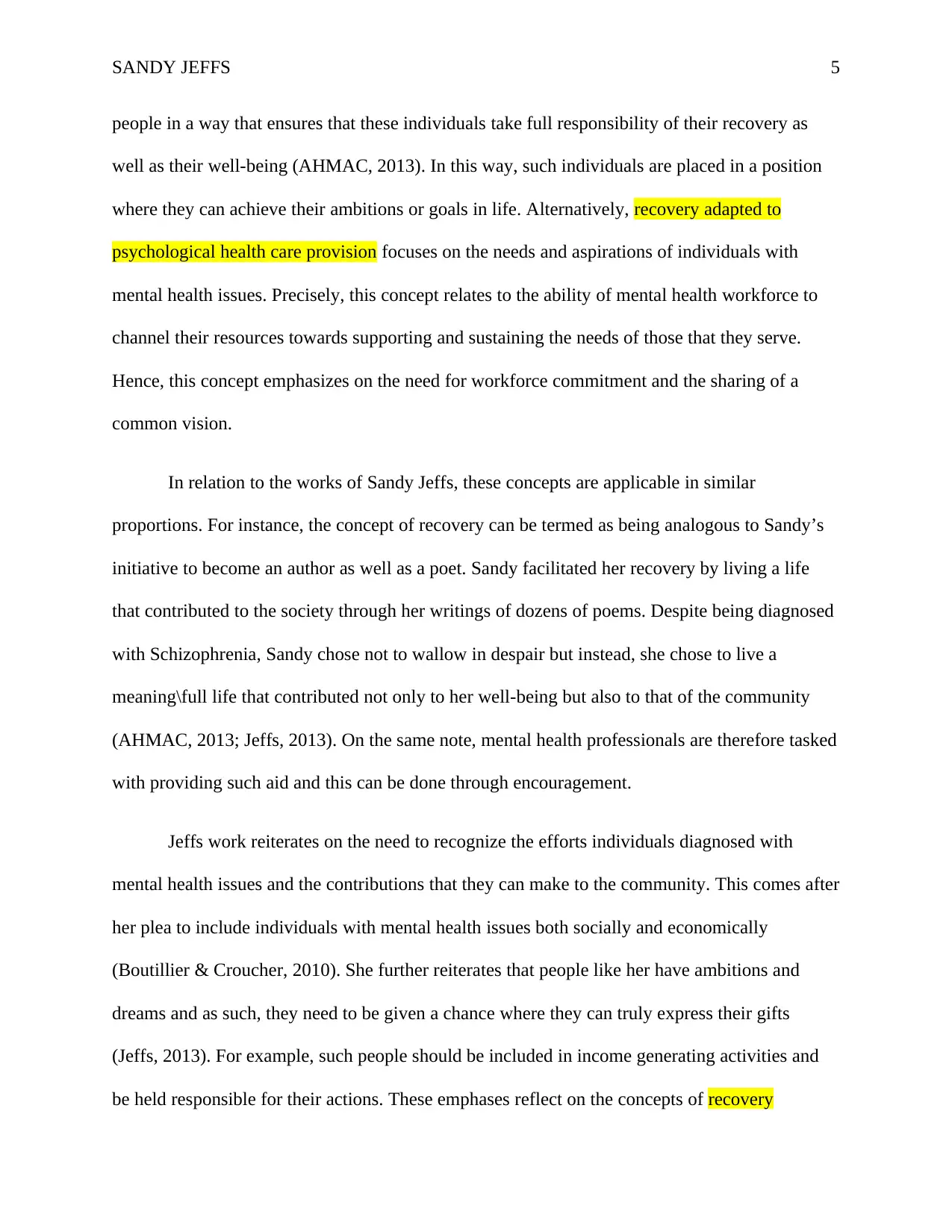
SANDY JEFFS 5
people in a way that ensures that these individuals take full responsibility of their recovery as
well as their well-being (AHMAC, 2013). In this way, such individuals are placed in a position
where they can achieve their ambitions or goals in life. Alternatively, recovery adapted to
psychological health care provision focuses on the needs and aspirations of individuals with
mental health issues. Precisely, this concept relates to the ability of mental health workforce to
channel their resources towards supporting and sustaining the needs of those that they serve.
Hence, this concept emphasizes on the need for workforce commitment and the sharing of a
common vision.
In relation to the works of Sandy Jeffs, these concepts are applicable in similar
proportions. For instance, the concept of recovery can be termed as being analogous to Sandy’s
initiative to become an author as well as a poet. Sandy facilitated her recovery by living a life
that contributed to the society through her writings of dozens of poems. Despite being diagnosed
with Schizophrenia, Sandy chose not to wallow in despair but instead, she chose to live a
meaning\full life that contributed not only to her well-being but also to that of the community
(AHMAC, 2013; Jeffs, 2013). On the same note, mental health professionals are therefore tasked
with providing such aid and this can be done through encouragement.
Jeffs work reiterates on the need to recognize the efforts individuals diagnosed with
mental health issues and the contributions that they can make to the community. This comes after
her plea to include individuals with mental health issues both socially and economically
(Boutillier & Croucher, 2010). She further reiterates that people like her have ambitions and
dreams and as such, they need to be given a chance where they can truly express their gifts
(Jeffs, 2013). For example, such people should be included in income generating activities and
be held responsible for their actions. These emphases reflect on the concepts of recovery
people in a way that ensures that these individuals take full responsibility of their recovery as
well as their well-being (AHMAC, 2013). In this way, such individuals are placed in a position
where they can achieve their ambitions or goals in life. Alternatively, recovery adapted to
psychological health care provision focuses on the needs and aspirations of individuals with
mental health issues. Precisely, this concept relates to the ability of mental health workforce to
channel their resources towards supporting and sustaining the needs of those that they serve.
Hence, this concept emphasizes on the need for workforce commitment and the sharing of a
common vision.
In relation to the works of Sandy Jeffs, these concepts are applicable in similar
proportions. For instance, the concept of recovery can be termed as being analogous to Sandy’s
initiative to become an author as well as a poet. Sandy facilitated her recovery by living a life
that contributed to the society through her writings of dozens of poems. Despite being diagnosed
with Schizophrenia, Sandy chose not to wallow in despair but instead, she chose to live a
meaning\full life that contributed not only to her well-being but also to that of the community
(AHMAC, 2013; Jeffs, 2013). On the same note, mental health professionals are therefore tasked
with providing such aid and this can be done through encouragement.
Jeffs work reiterates on the need to recognize the efforts individuals diagnosed with
mental health issues and the contributions that they can make to the community. This comes after
her plea to include individuals with mental health issues both socially and economically
(Boutillier & Croucher, 2010). She further reiterates that people like her have ambitions and
dreams and as such, they need to be given a chance where they can truly express their gifts
(Jeffs, 2013). For example, such people should be included in income generating activities and
be held responsible for their actions. These emphases reflect on the concepts of recovery
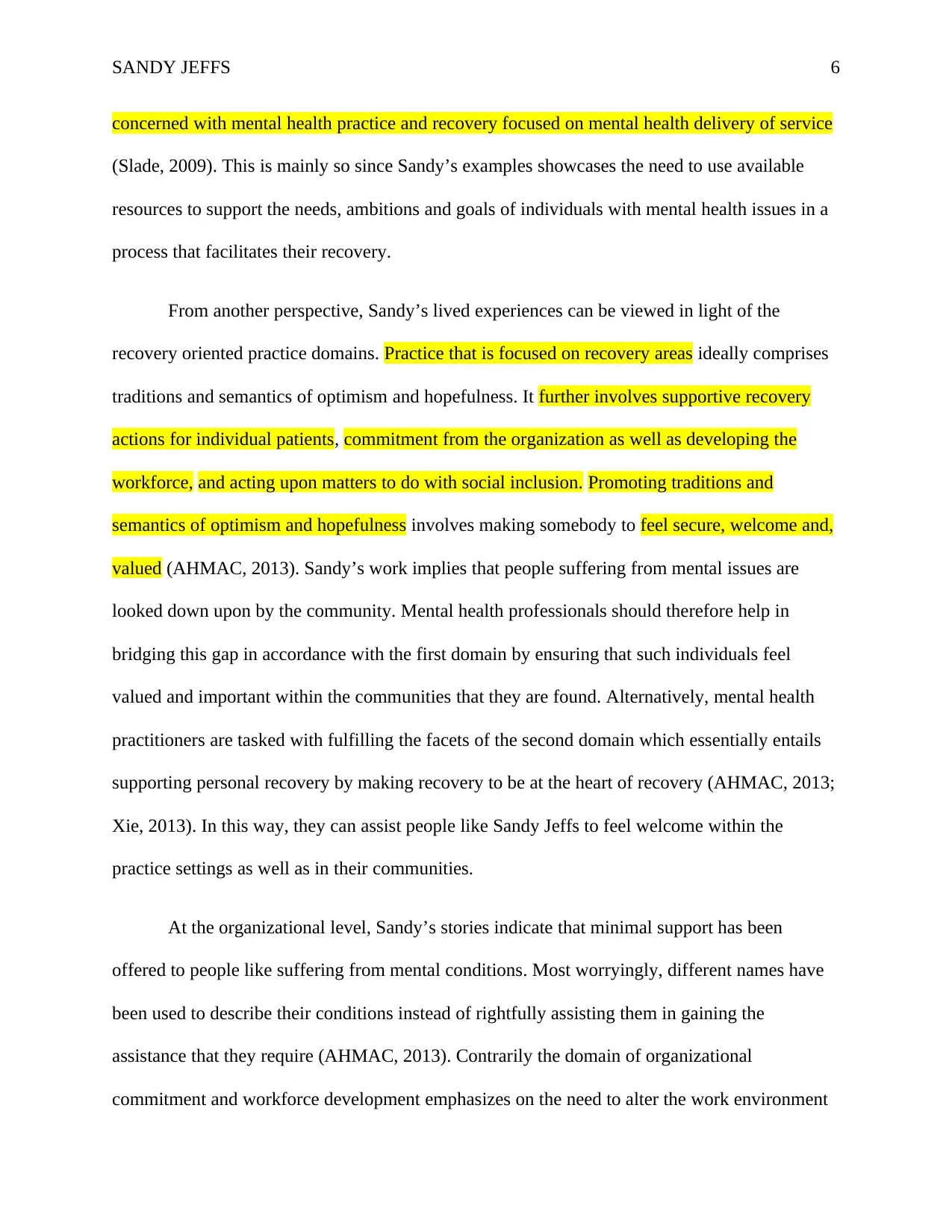
SANDY JEFFS 6
concerned with mental health practice and recovery focused on mental health delivery of service
(Slade, 2009). This is mainly so since Sandy’s examples showcases the need to use available
resources to support the needs, ambitions and goals of individuals with mental health issues in a
process that facilitates their recovery.
From another perspective, Sandy’s lived experiences can be viewed in light of the
recovery oriented practice domains. Practice that is focused on recovery areas ideally comprises
traditions and semantics of optimism and hopefulness. It further involves supportive recovery
actions for individual patients, commitment from the organization as well as developing the
workforce, and acting upon matters to do with social inclusion. Promoting traditions and
semantics of optimism and hopefulness involves making somebody to feel secure, welcome and,
valued (AHMAC, 2013). Sandy’s work implies that people suffering from mental issues are
looked down upon by the community. Mental health professionals should therefore help in
bridging this gap in accordance with the first domain by ensuring that such individuals feel
valued and important within the communities that they are found. Alternatively, mental health
practitioners are tasked with fulfilling the facets of the second domain which essentially entails
supporting personal recovery by making recovery to be at the heart of recovery (AHMAC, 2013;
Xie, 2013). In this way, they can assist people like Sandy Jeffs to feel welcome within the
practice settings as well as in their communities.
At the organizational level, Sandy’s stories indicate that minimal support has been
offered to people like suffering from mental conditions. Most worryingly, different names have
been used to describe their conditions instead of rightfully assisting them in gaining the
assistance that they require (AHMAC, 2013). Contrarily the domain of organizational
commitment and workforce development emphasizes on the need to alter the work environment
concerned with mental health practice and recovery focused on mental health delivery of service
(Slade, 2009). This is mainly so since Sandy’s examples showcases the need to use available
resources to support the needs, ambitions and goals of individuals with mental health issues in a
process that facilitates their recovery.
From another perspective, Sandy’s lived experiences can be viewed in light of the
recovery oriented practice domains. Practice that is focused on recovery areas ideally comprises
traditions and semantics of optimism and hopefulness. It further involves supportive recovery
actions for individual patients, commitment from the organization as well as developing the
workforce, and acting upon matters to do with social inclusion. Promoting traditions and
semantics of optimism and hopefulness involves making somebody to feel secure, welcome and,
valued (AHMAC, 2013). Sandy’s work implies that people suffering from mental issues are
looked down upon by the community. Mental health professionals should therefore help in
bridging this gap in accordance with the first domain by ensuring that such individuals feel
valued and important within the communities that they are found. Alternatively, mental health
practitioners are tasked with fulfilling the facets of the second domain which essentially entails
supporting personal recovery by making recovery to be at the heart of recovery (AHMAC, 2013;
Xie, 2013). In this way, they can assist people like Sandy Jeffs to feel welcome within the
practice settings as well as in their communities.
At the organizational level, Sandy’s stories indicate that minimal support has been
offered to people like suffering from mental conditions. Most worryingly, different names have
been used to describe their conditions instead of rightfully assisting them in gaining the
assistance that they require (AHMAC, 2013). Contrarily the domain of organizational
commitment and workforce development emphasizes on the need to alter the work environment
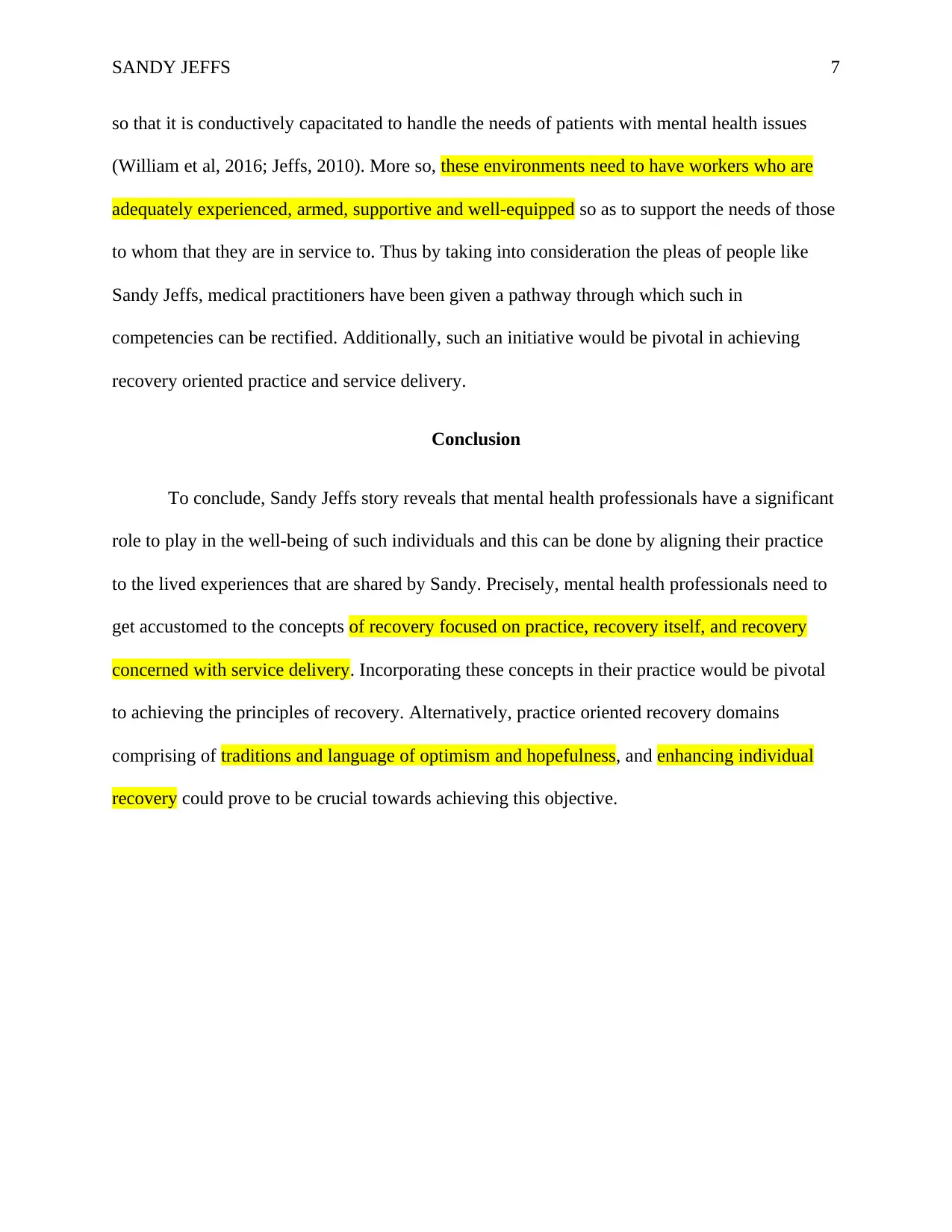
SANDY JEFFS 7
so that it is conductively capacitated to handle the needs of patients with mental health issues
(William et al, 2016; Jeffs, 2010). More so, these environments need to have workers who are
adequately experienced, armed, supportive and well-equipped so as to support the needs of those
to whom that they are in service to. Thus by taking into consideration the pleas of people like
Sandy Jeffs, medical practitioners have been given a pathway through which such in
competencies can be rectified. Additionally, such an initiative would be pivotal in achieving
recovery oriented practice and service delivery.
Conclusion
To conclude, Sandy Jeffs story reveals that mental health professionals have a significant
role to play in the well-being of such individuals and this can be done by aligning their practice
to the lived experiences that are shared by Sandy. Precisely, mental health professionals need to
get accustomed to the concepts of recovery focused on practice, recovery itself, and recovery
concerned with service delivery. Incorporating these concepts in their practice would be pivotal
to achieving the principles of recovery. Alternatively, practice oriented recovery domains
comprising of traditions and language of optimism and hopefulness, and enhancing individual
recovery could prove to be crucial towards achieving this objective.
so that it is conductively capacitated to handle the needs of patients with mental health issues
(William et al, 2016; Jeffs, 2010). More so, these environments need to have workers who are
adequately experienced, armed, supportive and well-equipped so as to support the needs of those
to whom that they are in service to. Thus by taking into consideration the pleas of people like
Sandy Jeffs, medical practitioners have been given a pathway through which such in
competencies can be rectified. Additionally, such an initiative would be pivotal in achieving
recovery oriented practice and service delivery.
Conclusion
To conclude, Sandy Jeffs story reveals that mental health professionals have a significant
role to play in the well-being of such individuals and this can be done by aligning their practice
to the lived experiences that are shared by Sandy. Precisely, mental health professionals need to
get accustomed to the concepts of recovery focused on practice, recovery itself, and recovery
concerned with service delivery. Incorporating these concepts in their practice would be pivotal
to achieving the principles of recovery. Alternatively, practice oriented recovery domains
comprising of traditions and language of optimism and hopefulness, and enhancing individual
recovery could prove to be crucial towards achieving this objective.
Paraphrase This Document
Need a fresh take? Get an instant paraphrase of this document with our AI Paraphraser
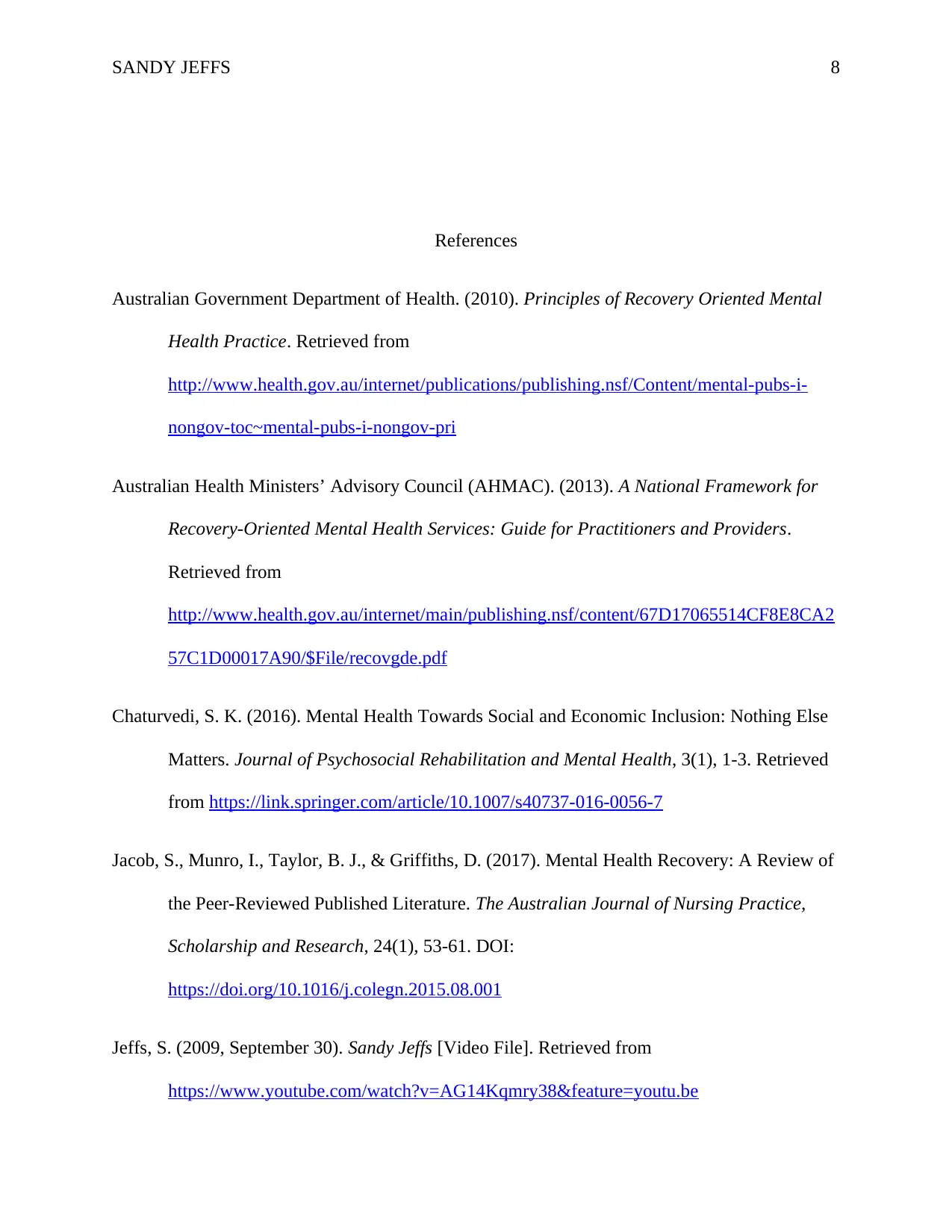
SANDY JEFFS 8
References
Australian Government Department of Health. (2010). Principles of Recovery Oriented Mental
Health Practice. Retrieved from
http://www.health.gov.au/internet/publications/publishing.nsf/Content/mental-pubs-i-
nongov-toc~mental-pubs-i-nongov-pri
Australian Health Ministers’ Advisory Council (AHMAC). (2013). A National Framework for
Recovery-Oriented Mental Health Services: Guide for Practitioners and Providers.
Retrieved from
http://www.health.gov.au/internet/main/publishing.nsf/content/67D17065514CF8E8CA2
57C1D00017A90/$File/recovgde.pdf
Chaturvedi, S. K. (2016). Mental Health Towards Social and Economic Inclusion: Nothing Else
Matters. Journal of Psychosocial Rehabilitation and Mental Health, 3(1), 1-3. Retrieved
from https://link.springer.com/article/10.1007/s40737-016-0056-7
Jacob, S., Munro, I., Taylor, B. J., & Griffiths, D. (2017). Mental Health Recovery: A Review of
the Peer-Reviewed Published Literature. The Australian Journal of Nursing Practice,
Scholarship and Research, 24(1), 53-61. DOI:
https://doi.org/10.1016/j.colegn.2015.08.001
Jeffs, S. (2009, September 30). Sandy Jeffs [Video File]. Retrieved from
https://www.youtube.com/watch?v=AG14Kqmry38&feature=youtu.be
References
Australian Government Department of Health. (2010). Principles of Recovery Oriented Mental
Health Practice. Retrieved from
http://www.health.gov.au/internet/publications/publishing.nsf/Content/mental-pubs-i-
nongov-toc~mental-pubs-i-nongov-pri
Australian Health Ministers’ Advisory Council (AHMAC). (2013). A National Framework for
Recovery-Oriented Mental Health Services: Guide for Practitioners and Providers.
Retrieved from
http://www.health.gov.au/internet/main/publishing.nsf/content/67D17065514CF8E8CA2
57C1D00017A90/$File/recovgde.pdf
Chaturvedi, S. K. (2016). Mental Health Towards Social and Economic Inclusion: Nothing Else
Matters. Journal of Psychosocial Rehabilitation and Mental Health, 3(1), 1-3. Retrieved
from https://link.springer.com/article/10.1007/s40737-016-0056-7
Jacob, S., Munro, I., Taylor, B. J., & Griffiths, D. (2017). Mental Health Recovery: A Review of
the Peer-Reviewed Published Literature. The Australian Journal of Nursing Practice,
Scholarship and Research, 24(1), 53-61. DOI:
https://doi.org/10.1016/j.colegn.2015.08.001
Jeffs, S. (2009, September 30). Sandy Jeffs [Video File]. Retrieved from
https://www.youtube.com/watch?v=AG14Kqmry38&feature=youtu.be
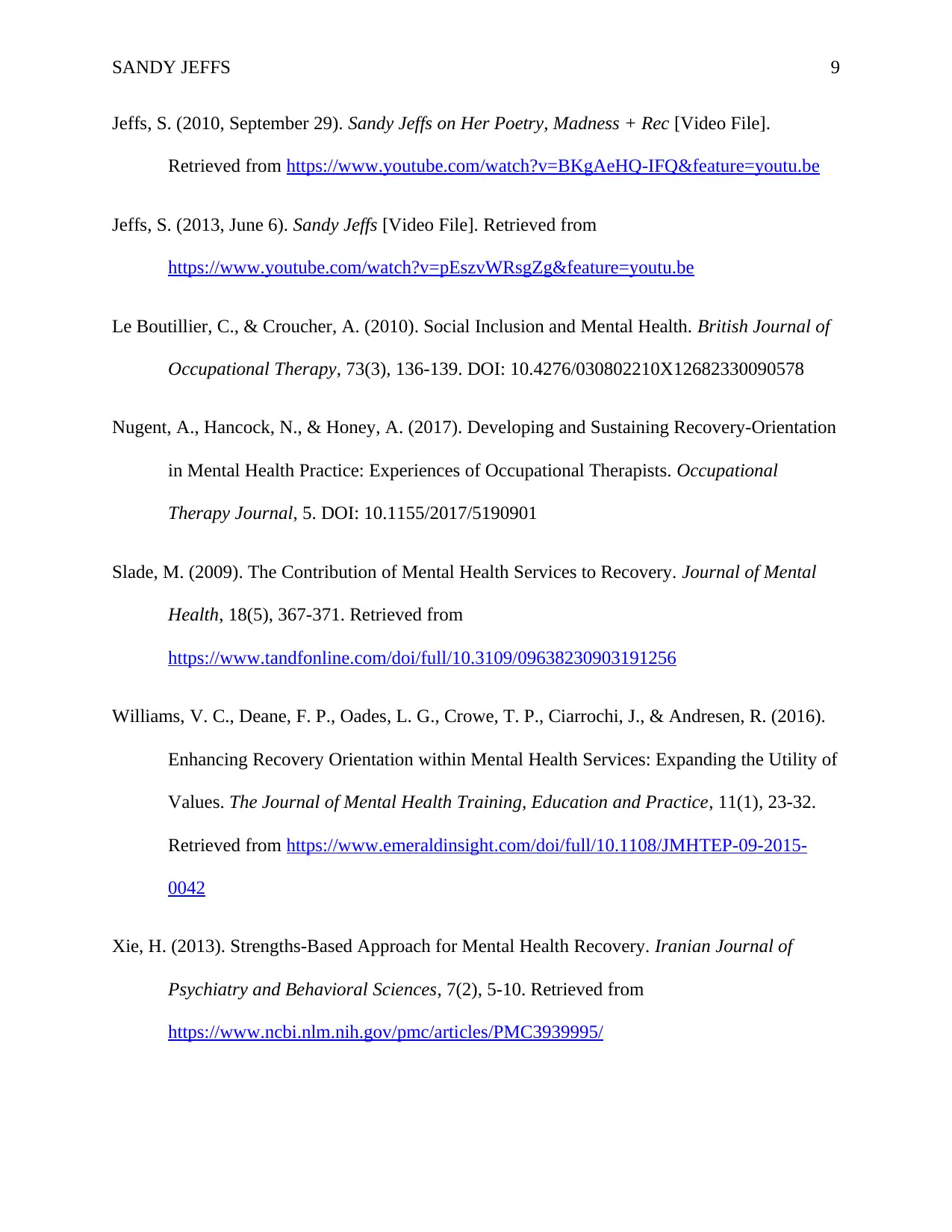
SANDY JEFFS 9
Jeffs, S. (2010, September 29). Sandy Jeffs on Her Poetry, Madness + Rec [Video File].
Retrieved from https://www.youtube.com/watch?v=BKgAeHQ-IFQ&feature=youtu.be
Jeffs, S. (2013, June 6). Sandy Jeffs [Video File]. Retrieved from
https://www.youtube.com/watch?v=pEszvWRsgZg&feature=youtu.be
Le Boutillier, C., & Croucher, A. (2010). Social Inclusion and Mental Health. British Journal of
Occupational Therapy, 73(3), 136-139. DOI: 10.4276/030802210X12682330090578
Nugent, A., Hancock, N., & Honey, A. (2017). Developing and Sustaining Recovery-Orientation
in Mental Health Practice: Experiences of Occupational Therapists. Occupational
Therapy Journal, 5. DOI: 10.1155/2017/5190901
Slade, M. (2009). The Contribution of Mental Health Services to Recovery. Journal of Mental
Health, 18(5), 367-371. Retrieved from
https://www.tandfonline.com/doi/full/10.3109/09638230903191256
Williams, V. C., Deane, F. P., Oades, L. G., Crowe, T. P., Ciarrochi, J., & Andresen, R. (2016).
Enhancing Recovery Orientation within Mental Health Services: Expanding the Utility of
Values. The Journal of Mental Health Training, Education and Practice, 11(1), 23-32.
Retrieved from https://www.emeraldinsight.com/doi/full/10.1108/JMHTEP-09-2015-
0042
Xie, H. (2013). Strengths-Based Approach for Mental Health Recovery. Iranian Journal of
Psychiatry and Behavioral Sciences, 7(2), 5-10. Retrieved from
https://www.ncbi.nlm.nih.gov/pmc/articles/PMC3939995/
Jeffs, S. (2010, September 29). Sandy Jeffs on Her Poetry, Madness + Rec [Video File].
Retrieved from https://www.youtube.com/watch?v=BKgAeHQ-IFQ&feature=youtu.be
Jeffs, S. (2013, June 6). Sandy Jeffs [Video File]. Retrieved from
https://www.youtube.com/watch?v=pEszvWRsgZg&feature=youtu.be
Le Boutillier, C., & Croucher, A. (2010). Social Inclusion and Mental Health. British Journal of
Occupational Therapy, 73(3), 136-139. DOI: 10.4276/030802210X12682330090578
Nugent, A., Hancock, N., & Honey, A. (2017). Developing and Sustaining Recovery-Orientation
in Mental Health Practice: Experiences of Occupational Therapists. Occupational
Therapy Journal, 5. DOI: 10.1155/2017/5190901
Slade, M. (2009). The Contribution of Mental Health Services to Recovery. Journal of Mental
Health, 18(5), 367-371. Retrieved from
https://www.tandfonline.com/doi/full/10.3109/09638230903191256
Williams, V. C., Deane, F. P., Oades, L. G., Crowe, T. P., Ciarrochi, J., & Andresen, R. (2016).
Enhancing Recovery Orientation within Mental Health Services: Expanding the Utility of
Values. The Journal of Mental Health Training, Education and Practice, 11(1), 23-32.
Retrieved from https://www.emeraldinsight.com/doi/full/10.1108/JMHTEP-09-2015-
0042
Xie, H. (2013). Strengths-Based Approach for Mental Health Recovery. Iranian Journal of
Psychiatry and Behavioral Sciences, 7(2), 5-10. Retrieved from
https://www.ncbi.nlm.nih.gov/pmc/articles/PMC3939995/

SANDY JEFFS 10
1 out of 10
Related Documents
Your All-in-One AI-Powered Toolkit for Academic Success.
+13062052269
info@desklib.com
Available 24*7 on WhatsApp / Email
![[object Object]](/_next/static/media/star-bottom.7253800d.svg)
Unlock your academic potential
© 2024 | Zucol Services PVT LTD | All rights reserved.




